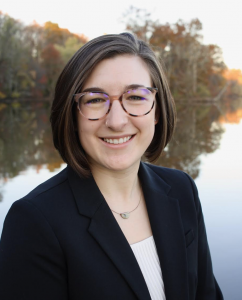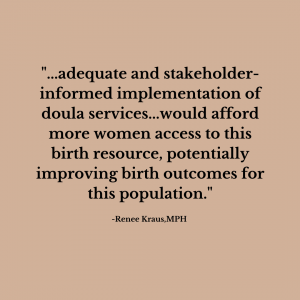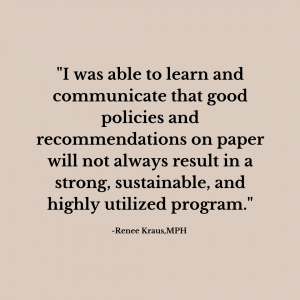As a distance learning student, I wanted to find a way to tie my field experience in New Jersey back to emerging health policies in Minnesota. To this end, I decided to incorporate learnings from other states to make policy recommendations for the impending coverage of doula services by Medicaid in NJ. In the summer of 2019, I completed my Master of Public Health (MPH) Field Experience with the Children’s Home Society of New Jersey (CHSofNJ), a community-based organization in Trenton, NJ. In 2019, NJ passed a number of laws that aimed to positively impact maternal and child health (MCH). One of these laws was P.L. 2019, c. 85, which requires Medicaid to cover comprehensive maternity care, including doula services. My colleagues at CHSofNJ and I knew that Medicaid reimbursement for doula services had not been highly utilized in other states, such as MN and OR. We wanted to take learnings from other states to propose implementation recommendations that would address many of these issues and incentivize doulas to bill Medicaid for their services in NJ.
What are Doulas?
Doulas are professionally trained birth workers who traditionally support women and their families during prenatal, birth, and postpartum. Doula services are often expensive and not covered by medical insurance. Community doulas are doulas who approach their work with an equity lens, typically work with younger, lower-resourced women, and live in the same communities that they serve. There are many types of doulas: prenatal, postpartum, birth, abortion, end of life; doulas support women and families through these life events. Doulas are also important because they often act as patient advocates.
We anticipated that adequate and stakeholder-informed implementation of doula services in a state Medicaid plan would afford more women access to this birth resource, potentially improving birth outcomes for this population. Studies show that doulas help reduce rates of cesarean sections, premature/low-birth weight babies, and postpartum depression. Doulas also positively impact breastfeeding rates (Every Mother Counts, et al., 2019). This means that patients who can afford doula services may be more likely to experience positive birth outcomes. Doulas will not be the answer to the systemic racism in our healthcare system that has led to inequitable birth outcomes; however, broader access to doula care may improve health outcomes for more mothers and babies.
In 2019, CHSofNJ established a new community doula program for Spanish speaking pregnant people in Trenton. Through this program, over a dozen Latinx participants completed a 20-session HealthConnect One training. My policy-based project became part of the long-term sustainability plan for this program. We thought that if organizations in NJ could one day bill Medicaid for doula services, CHSofNJ will be able to employ more women, full-time and with benefits, without relying solely on grant funding. Additionally, women who complete a doula training and are not employed by an organization would also be able to independently bill Medicaid for their services.
Through this work I conducted a literature review of current and proposed NJ state MCH policies and doula implementation experiences in other states (MN, OR, and a NY pilot). I also met and spoke with key doula stakeholders from MN, OR, MA, NY, CA, and NJ to refine recommendations for doula reimbursement by Medicaid. Some best practice topics include: reimbursement amounts, mode of claim filing, minimum training and certification requirements, minimizing barriers to entry, and professional development and capacity building to work with diverse communities. I validated the stakeholder comments with academic sources and by connecting with doula training/certifying organizations to compare rigor and cost. These recommendations were then compiled in a public comment submission to the New Jersey Department of Human Services (NJDHS), which manages Medicaid in NJ. The public comment period on the proposed amendment was open during my field experience, which allowed for an easy way to communicate our recommendations.
Near the end of my field experience, my CHSofNJ colleagues and I met with the Medicaid Director and Medical Director at the NJDHS to discuss these recommendations. Through this meeting, we learned that NJ Medicaid was committed to making its doula implementation plan a supported program rather than just a means for service reimbursement. These program supports could include, but are not limited to, providing assistance to doulas as they enroll and bill as Medicaid providers and providing professional development opportunities. At the time, we were the first community group that these leaders had spoken to about this initiative. Later, we joined the same directors in a statewide convening of doula stakeholders.
Effective January 1, 2021, all Medicaid Managed Care Organizations in NJ began reimbursing doulas through a fee-for-service model. In this model many of our recommendations have been implemented. Most clients can receive up to eight perinatal visits and one labor support visit and if the client is 19 years old or younger they can receive up to 12 perinatal visits and one labor support visit. Additionally, doulas are eligible for an incentive payment if their clients return to their providers for the six-week postpartum visit. While the reimbursement amount is not as high as we recommended in our public comment, there are no fees for doulas to register as a Medicaid provider or to complete the necessary screenings. Additionally, doulas in NJ can bill Medicaid independently or the organization they work for can bill on their behalf.
Through my MPH field experience and culminating experience presentation, I was able to learn and communicate that good policies and recommendations on paper will not always result in a strong, sustainable, and highly utilized program. I hope that NJ can continue to foster a strong doula network to communicate these new reimbursement opportunities, help independent doulas, who are not part of an organization, navigate the lengthy application and billing process, and continue to incorporate their experiences and opinions into future iterations of this fee-for-service model. I am excited to use what I learned from my time at UMN to continue to be part of the healthcare and policy teams that elevate the voices of doulas and birthing people in NJ.
Renee is a proud first generation college student and alumni of the 2020 Advanced Standing MPH-Maternal and Child Health class. She also holds a Bachelors of Science in Nursing from Regis University in Denver, CO. Renee is a 2021 New Leaders Council Fellow and recently joined the NJ Department of Health to serve as the Project Manager of the NJ Maternal Mortality Review Committee. In this role, she applies her clinical and project management experience to analyze and communicate health data, inform health policy, and improve the systems that serve birthing people in NJ.


